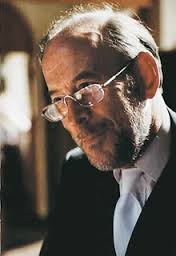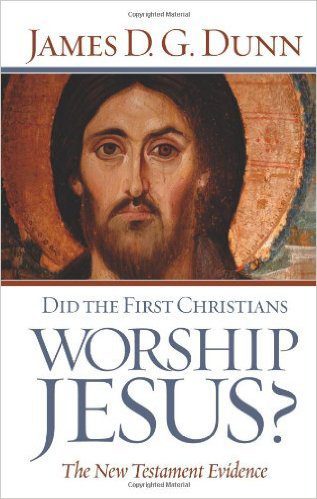 James D.G. Dunn authored the important and accessible book, Did the First Christians Worship Jesus?: The New Testament Evidence (WJK, 2010, 176 pp., paperback). He is a leading New Testament scholar and generally regarded as the world’s foremost authority on Christology. That’s mostly due to his more dense book, Christology in the Making (1980/1996).
James D.G. Dunn authored the important and accessible book, Did the First Christians Worship Jesus?: The New Testament Evidence (WJK, 2010, 176 pp., paperback). He is a leading New Testament scholar and generally regarded as the world’s foremost authority on Christology. That’s mostly due to his more dense book, Christology in the Making (1980/1996).
Did the First Christians Worship Jesu s? is a rather provocative book for a moderately-conservative, evangelical scholar of Dunn’s stature. In his previous books, he has embraced the traditional view that Jesus is God and God is triune. So, Dunn accepts the idea of a later, developed, high Christology, endorsing the classical doctrine of Incarnation—that God became the man Jesus. But Dunn doesn’t think the earliest Christians believed that. He says, “Did the first Christians worship Jesus?… No, by and large the first Christians did not worship Jesus as such” (p. 150). He adds, “So our central question can indeed be answered negatively, and perhaps it should be” (151). Dunn earlier says of Jesus, “He was not to be worshipped as wholly God or fully identified with God…. only God, only the one God, is to be worshipped” (146).
s? is a rather provocative book for a moderately-conservative, evangelical scholar of Dunn’s stature. In his previous books, he has embraced the traditional view that Jesus is God and God is triune. So, Dunn accepts the idea of a later, developed, high Christology, endorsing the classical doctrine of Incarnation—that God became the man Jesus. But Dunn doesn’t think the earliest Christians believed that. He says, “Did the first Christians worship Jesus?… No, by and large the first Christians did not worship Jesus as such” (p. 150). He adds, “So our central question can indeed be answered negatively, and perhaps it should be” (151). Dunn earlier says of Jesus, “He was not to be worshipped as wholly God or fully identified with God…. only God, only the one God, is to be worshipped” (146).
At this point, most Christians will exclaim “foul ball” or the like. Why? Since the 4th century, the church has proclaimed that Jesus is fully God as well as fully man and that he must be worshipped as God. Those who don’t, the church deems them non-Christian.
Dunn introduces this book by explaining that two of his colleagues and dialogue partners to whom he dedicates the book—Richard Bauckham and Larry Hurtado—assert that the early Christians worshipped Jesus as God. Dunn states, “I am concerned to ensure that the whole picture is brought into view, and that texts,… are not neglected” (4). Thus, this book is partially an attempt to balance, if not correct, their views.
In chapter one, Dunn explores Bible words usually translated “worship.” He says both the Hebrew shachah and the Greek proskuneo refer mostly to the physical act of bowing down either as prostration or genuflection. He cites Bible reports of people doing such acts toward some object, such as God, a human superior, such as a king, or Jesus. Regarding our English word “worship,” which conveys an attitude and therefore not an act, Dunn observes of the New Testament (NT), “Christian tradition envisaged different grades or degrees of worship” (18). He concludes, “Cultic worship and service (latreuein, latreia) as such is never offered to Christ, and other worship terms are used only in relation to God … the most common words for praise and thanksgiving (eucharistein), they too are never offered to Christ” (27).
In chapter two, Dunn analyzes the practice of worship reported in the Bible. He lists four elements of early Christian worship: prayer, hymns, sacred times, and giving alms (30). He explains that even though it is legitimate to petition Jesus for help (35), “(T)the most explicit prayer language is used exclusively of prayer to God” (37). He also relates that the NT contains hymns which he contends, in apparent opposition to Hurtado, “are canticles in praise of God, not Christ” (40). And he says the New Testament (NT) contains “Christ hymns,” such as in Phil 2.5-11 and Col 1.15-20, explaining that “they are hymns to God, praising God for Christ” (41).
Chapter three is a response to the thesis of Bauckham and Hurtado, who say Jewish monotheism of Second Temple Judaism was not strict but provided a bridge to enable the early Christians to worship Jesus, indicating they viewed him as God. Dunn treats God’s angels, Spirit, Wisdom, Word, and exalted humans to show, “(I)in no case was the thought of worshipping other than God entertained.” Thus, “Second Temple Judaism … provided no precedent to which the first Christians could appeal” to worship Jesus as God (90). Dunn later questions the utility of Bauckham’s coined and repeated expression “divine identity” (141-144). Dunn obviously disagrees with Bauckham and Hurtado by contending that Christian worship of Jesus and a high Christology are late first century developments, a view his PhD professor C.F.D. Moule popularized.
In chapter four, Dunn addresses the hot topic: “Was Jesus a monotheist?”[1] Dunn seems equivocal by answering, “at least initially with a straight ‘Yes.’ Jesus was a monotheist; he confessed God as one…. He worshipped this God alone” (101). If “initially,” did Jesus change later? In the sub-title, “Jesus is Lord”—a litmus test for early Christians, but later Christians equated it with “Jesus is God”—Dunn states, as in his The Theology of Paul the Apostle (254), “the kyrios [lord] title is not so much a way of identifying Jesus with [=as] God, as a way of distinguishing Jesus from God” (110). Does Dunn contradict himself on this important point by stating in his introduction, “Jesus as Lord,…avers a divine status for Jesus” (3)?
Chapter four’s sub-title is “Jesus as god/God?” Dunn begins, “In some ways this is the most difficult issue: that in the New Testament Jesus is sometimes called ‘god,’ or should we say ‘God’? If ‘god,’ is not that a step towards polytheism—Jesus was a second god beside the creator God? If ‘God,’ then how are we to make sense of the first Christians’ clear memory that Jesus called for worship to be given only to God, and himself regularly prayed to God as his God and Father?” (132.) Dunn has this sub-title here (132) and in his The Theology of Paul the Apostle (252); in neither case, I think, does he provide a clear answer. Does it indicate uncertainty? Nonetheless, Dunn well states here, “Jesus Christ [is] seen more as … God manifesting himself in and through Jesus, than as God or a god as such” (133). Dunn adds, “Jesus was God, in that he made God known,… but he was not God in himself” (135). While Dunn is known for not affirming much of the Fourth Gospel as authentic, he says of John 10.30-38 that Jesus denies the charge he makes himself God (135n93). Yet, Dunn just wrote, “The book of Revelation … its affirmation of the deity of Christ is unqualified” (130).
In Dunn’s previous writings, like many New Testament scholars he believes (1) the Gospel of John was written in the 90s, (2) it identifies Jesus as God, and (3) this does not reflect the belief of the earliest Christians. Here, Dunn perceives “the attribution of the title ‘God/god’ to Jesus in John’s gospel” (134). In Christology in the Making, Dunn states concerning John 1.14 (compared with v. 1c), “Here we have an explicit statement of incarnation, the first, and indeed only such statement in the NT” (241). But in this book Dunn writes, “Jesus is not the God of Israel. He is not the Father. He is not Yahweh” (142). This will provoke most Christians because they are taught the doctrine of the Trinity, that Jesus is God, the God of Israel, and thus Yahweh. (Of course, Trinitarians agree that Jesus is not the Father, whereas United Pentecostals believe he is.) Dunn says the early Christians “recognized that God was still Jesus’ God, even the God of Jesus as Lord” (145). Dunn adds, “if Jesus is God he is not YHWH“ (144). “If Jesus is God”?
I count it a privilege to be a friend of Dr. Dunn, whom his friends call “Jimmy.” Nowadays, I sometimes wonder if he is almost in a place, theologically, that I was years ago. After being a Trinitarian Christian for twenty-two years, I decided that the doctrine of the Trinity is not in the Bible and thus it is wrong. But what was I to believe in its place? I concluded that the God of Israel is only the Father, whose name is YHWH. But who was and is Jesus? I undertook an in-depth study about it, devouring hundreds of books, many written by scholars like Jimmy Dunn. At first I was perplexed, thinking the NT occasionally calls Jesus “God.” But after five years, I became convinced that the NT nowhere identifies Jesus as God. And it took me another five years to conclude that the NT doesn’t say Jesus literally preexisted. In those ten years, I felt enlightened yet uncomfortable since I believed, like the Apologists, in two gods, a belief I now call “big God, little God.” I was much relieved when I came to understand that in the NT only the Father is God, so that Jesus is fully human and not God, and that he never actually preexisted.
Not so with Dunn. At the Annual Meeting of the Society of Biblical Literature in 2009, I heard him speak on his book Unity and Diversity in the New Testament (dedicated to Moule). He said that on the basis of the NT “it is not possible to view a single, unified Christian theology in the first century.” I respect Jimmy Dunn so much, but I’m not convinced of this. Years earlier, in 2000, he explained his view to me. I don’t think Jimmy has significantly changed his Christology in Did the First Christians; rather, it’s a matter of emphasis.
However, Jimmy’s conclusions in this book are unequivocal and hard hitting about not giving God the Father his due, similar to one author who wrote about the “Forgotten Father.” Dunn rightly implies that Christianity errs in being mostly christocentric instead of theocentric. What harm is there in doing that and thus worshipping Jesus as God? Dunn answers astutely, “Christian worship can deteriorate into what may be called Jesus-olatry…. I use the term ‘Jesus-olatry’ as in an important sense parallel or even close to ‘idolatry’…. The danger of Jesus-olatry is … that Jesus has been substituted for God…. Jesus is absorbing the worship due to God alone…. The worship due to God is stopping at Jesus.” (147). Right on! When I was a Trinitarian, I think I did that.
[For further reading about this book by Dunn, see my friend Scot McKnight’s post on Monday entitled “Jesus: when was he first worshipped?” here at patheos.com at his Jesus Creed blog. He briefly reviews this book. Dunn was McKnight’s PhD supervisor. Dunn was the first guest lecturer, in 2000, at the annual Kermit Zarley Lectures at North Park University in Chicago, which McKnight created and directed.]
[1] Technically, calling early Christians monotheists is anachronistic since the term “monotheism” was coined by philosopher Henry More in the seventeenth century. Trinitarians claim to be monotheists; but many religious Jews and all Muslims allege they are polytheists.












